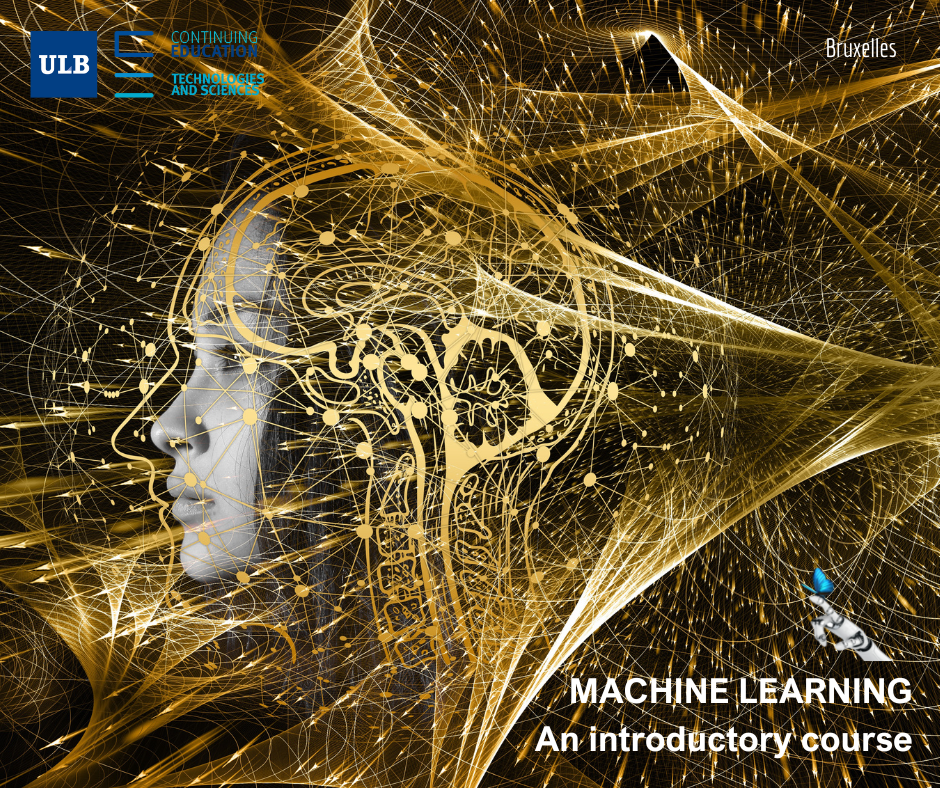- Accueil
- EN
- Studying at ULB
- Find your course
- fctsci
-
Share this page
University training in Machine Learning
Short presentation
An introduction to the basic concepts for any novice interested in machine learning processes.Accéder aux sections de la fiche
Call to actions
-
Programme titleUniversity training in Machine Learning
-
Programme mnemonicFC-852
-
Programme organised by
- Centre de formation continue en Technologies et en Sciences
- Faculty of Sciences
-
Title typeformation continue
-
Open to returning studentsyes
-
Schedule typeDaytime
-
Languages of instructionenglish / french
-
Programme durationmedium (6 to 15 days)
-
Category / TopicSciences and technics - Sciences
-
Contact e-mail
-
Additional information
Presentation
Details
General information
Title typeformation continue
Programme durationmedium (6 to 15 days)
Learning language(s)english / french
Schedule typeDaytime
Category(ies) - Topic(s)Sciences and technics - Sciences
Organising faculty(s) and university(ies) Open to returning studentsyes
PricesFull fee : 950€
Reduced fee (student/unemployed) : 650€
Express your interest

Academic teacher
Contacts
Saturday September 2nd, 2023 : 1st class
Express your interest
Presentation
Programme objectives
The objective of the training is to offer keys of understanding to people new to the field of machine learning. The training allows to demystify the tools used by data scientists, to manipulate simple models on real data as well as to provide a solid basis for students wishing to pursue further studies in the field.
Teaching team and methods
The course is composed of two learning methods: theoretical sessions with PowerPoint and programming exercises with Python.
Programme's added value
This training will aim to introduce the basic concepts of machine learning to a public totally new to the subject. We will have both a theoretical part with slides and a practical part where we will use the python programming language for the exercises. In the theoretical part, we will introduce concepts such as supervised, unsupervised and reinforcement learning. Some examples of classical algorithms will be presented such as tree-based models, naive Bayesian classification or neural networks. Without trying to formalize too much, the theoretical aspects of machine learning will be presented both intuitively and with the help of a mathematical formalism. For the programming part, the basic Python packages used in machine learning will be presented, but participants will be assumed to already have a good command of programming (ideally Python). At the end of the course, the objective is to have demystified the tools used by data scientists, to have manipulated simple models on real data, and to have provided a solid foundation for students wishing to pursue their studies in the field.
Schedule
Daytime
A total of 6 courses of 4 hours on Saturday morning starting Saturday, September 2, 2023.
From 9h-13h
Calendar & registration
Prerequisites
Admissions are based on a file. Candidates must present a certificate of completion of a first cycle degree, and preferably also a certificate of completion of a second cycle degree. Candidates holding other degrees may apply for a VAE and will have their applications examined on a case-by-case basis by the scientific committee.
Participants are expected to have some experience with programming and if possible in Python. A passive knowledge of English is essential. Experience with programming and an open mind for mathematics are recommended.Target audience
Calendar & registration
Programme
Introduction
An introduction to the basic concepts for any novice interested in machine learning processes. The objective is to demystify the tools used by data scientists and to manipulate simple models on real data. It is a basis for further studies in this field.
For all novices, interested in learning the basic techniques of machine learning who wish to familiarize themselves with simple data manipulation models and demystify the tools used by data scientists.
Program
- Course 1 : introduction to Machine learning from scratch
- Course 2 & 3 : Machine learning with Python
- Course 4 : The basics of deep learning
- Course 5 : Automatic learning for image and text analysis
- Course 6 : Data visualization and unsupervised learning
- Course 7 : End evaluation (to take in French or English)

